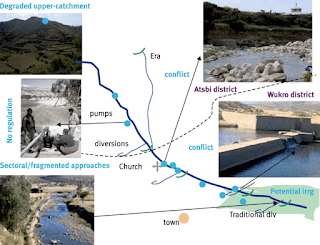Integrated Water Resource Management: The case of Ethiopia

Hello everyone, welcome back! As mentioned, this post is going to look at IWRM in practice. IWRM is often used as a fuzzy term to explain ways of managing water resources as recommended by various international organisations as the best way forward in improving water security. However, often it isn’t adequately transitioned from a set of principles and policies into reality. This post is going to look specifically at the Berki watershed in Ethiopia as a case study, as this is one of the selected trial locations for the initial stages of implementing IWRM (Global Water Partnership, 2015 ). Ethiopia is a country with immense water resource potential, however, due to the unequal distribution of water resources, as well as temporal factors influencing availability, around 50% of the population still don’t have sufficient access to an improved, safe water source. The region faces frequent droughts and floods, as well as an increasing population creating a higher demand for water...